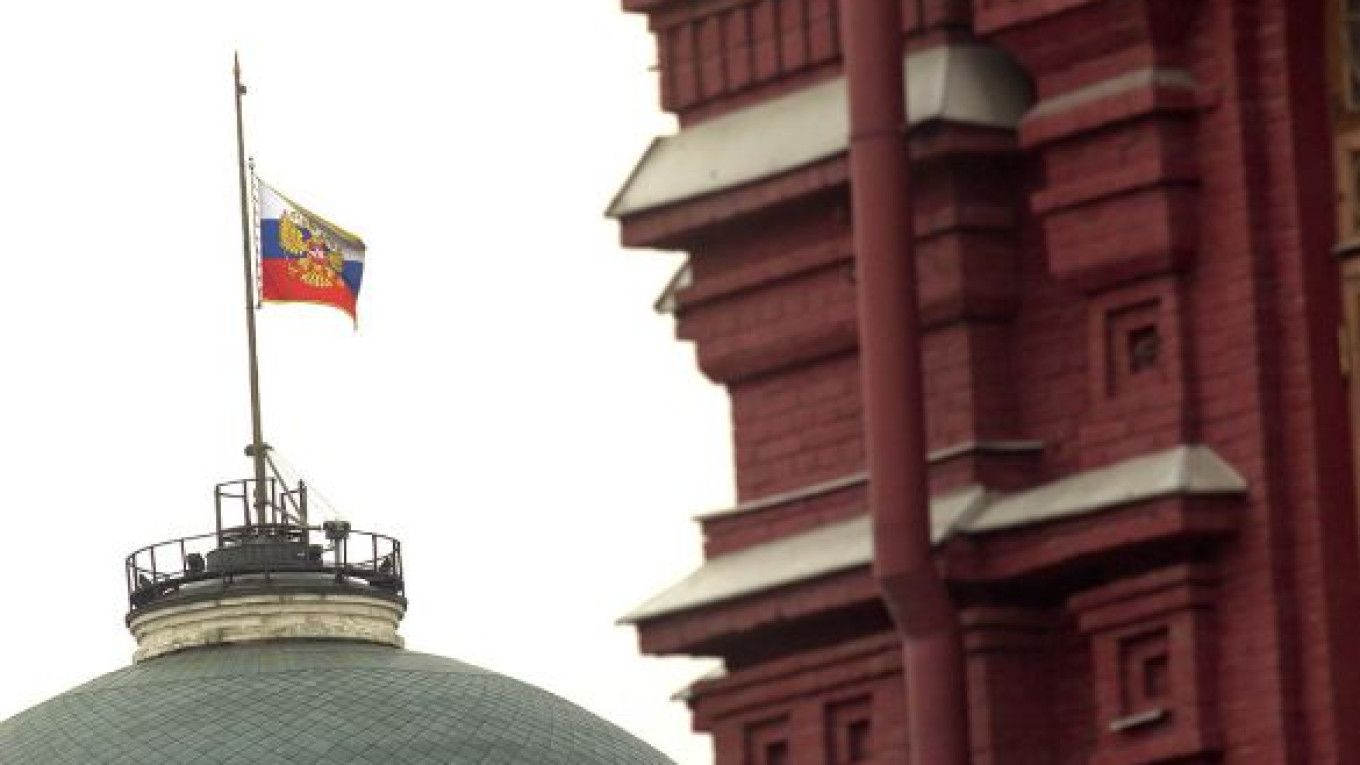In the wake of the deadly bus crash outside Moscow over the weekend, which has tentatively been blamed on a truck driver who repeatedly violated traffic rules, State Duma deputies Monday proposed tightening both traffic regulations and punishment for violating them.
Eighteen people were killed and more than 60 injured when a KamAZ truck carrying gravel rammed into a bus near the village of Oznobishino in New Moscow, territories largely to the southwest of Moscow that were annexed to the capital last year, at about 1 p.m. Saturday.
Thirty-one of the crash victims remained hospitalized Monday, with twelve of them in critical condition, the Health Ministry said on its website.
Police on Monday charged the truck driver, an unidentified 46-year-old Armenian national who was driving with an Armenian license and transit plates, with an unspecified violation of traffic rules, Moscow police said in a statement on its website.
An unidentified police official told Interfax that the driver exceeded the speed limit at a road turn "for reasons that so far remain unclear," causing his truck to fall on one side and most of the gravel to fall into the bus, gravely injuring passengers.
The truck may have been overloaded and also may have had faulty brakes, the official said.
The truck driver remained hospitalized Monday in stable condition and was able to testify, an unidentified hospital employee told Interfax.
The driver committed seven traffic violations last year, including crossing into an oncoming lane of traffic and driving a car in improper operating condition.
On Monday, State Duma Deputy Mikhail Degtyaryov of LDPR proposed a bill that would increase the maximum fine for driving with expired transit plates, which are temporary numbers given to a new car or one that is up for sale, from 800 rubles ($25) to 10,000 rubles ($306) for a first-time offender. For repeat offenders, a 5,000-ruble ($153) fine would be replaced by suspension of one's driver's license for up to three months.
The bill would also reduce the allowed period for driving with transit plates from 20 to 15 days.
Degtyaryov said transit plates allow drivers to avoid punishment for violating traffic rules because they are not included in a unified database of the national traffic police.
"Trust in their own impunity pushes these car owners not only to further violate traffic rules but to commit crimes as well," Degtyaryov said on his website in a note to the draft legislation. He also said transit plates allow drivers to avoid taxes.
But one United Russia lawmaker said Degtyaryov's bill was unnecessary, arguing that there was already adequate legislation regulating the roads.
"The State Duma has already taken all the necessary measures," said Vyacheslav Lysakov, who is also head of the Free Choice Motorists' Movement, in comments posted on the United Russia website.
Saturday's crash will speed up enforcement of legislation that would oblige holders of foreign driver's licenses to obtain Russian licenses, Mikhail Bryachak of United Russia, who is first deputy head of the Duma's Transportation Committee, told Izvestia. That law will take effect in the fall, Bryachak said, without elaborating.
Vitaly Yefimov, another first deputy head of the Transportation Committee, told The Moscow Times that before Saturday's crash, the law banning foreign licenses had been set to take effect on Nov. 1.
It was unclear on what date the law will now take effect.
Vladimir Gridin of United Russia, yet another first deputy head of the Transportation Committee, praised both Degtyaryov's bill and the law set to take effect Nov. 1, saying "the main thing" was to "make punishment unavoidable."
But Yefimov called both pieces of legislation "isolated measures," saying that "systemic measures" were needed that would tighten requirements for car owners, as opposed to drivers.
Contact the author at n.krainova@imedia.ru
A Message from The Moscow Times:
Dear readers,
We are facing unprecedented challenges. Russia's Prosecutor General's Office has designated The Moscow Times as an "undesirable" organization, criminalizing our work and putting our staff at risk of prosecution. This follows our earlier unjust labeling as a "foreign agent."
These actions are direct attempts to silence independent journalism in Russia. The authorities claim our work "discredits the decisions of the Russian leadership." We see things differently: we strive to provide accurate, unbiased reporting on Russia.
We, the journalists of The Moscow Times, refuse to be silenced. But to continue our work, we need your help.
Your support, no matter how small, makes a world of difference. If you can, please support us monthly starting from just $2. It's quick to set up, and every contribution makes a significant impact.
By supporting The Moscow Times, you're defending open, independent journalism in the face of repression. Thank you for standing with us.
Remind me later.


